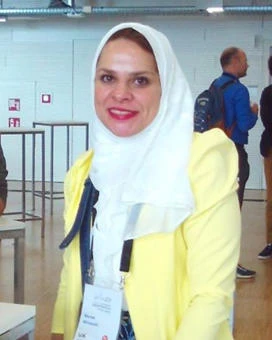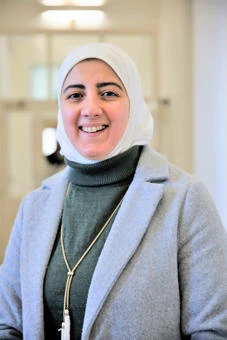At Worcester, you’ll be supported by experienced professionals and have the chance to apply your learning in real-world projects and work placements. This means you’ll graduate ready to make an impact on the fast-moving business industry.
This course has been mapped for dual accreditation with the Chartered Management Institute (CMI). You will be awarded a CMI Level 7 Certificate in Strategic Management & Leadership Practice, in addition to your degree, upon the successful completion of the entire degree.
During your studies, you will also benefit from associate membership to the CMI (at no extra cost), inclusive of an interactive induction session hosted by the CMI, as well as access to the CMI's digital library, resources, and employability skills audit.
Overview
This MSc in Human Resource Management is designed to help you build the knowledge and skills you need to succeed in HR, both in the UK and around the world. You’ll explore key topics like international business, sustainability, and employability so you’re ready to make an impact in today’s global workplace.
You’ll learn in a diverse, multicultural environment, working alongside students from different countries and backgrounds. This gives you the chance to share ideas, learn from each other, and understand how HR works in different parts of the world.
Throughout the course, you’ll work on real-life business case studies to understand how what you have learned can be applied in real situations. You can also choose to take a 6 or 12-month work placement, giving you a deeper understanding of how HR works in practice whilst building on your portfolio of professional contacts.
Sustainability is a key theme across the course. You’ll explore what it means to be a responsible and ethical leader, and how HR can support sustainable business practices.
You’ll be taught by experienced business professionals who have extensive experience in project management, consultancy, and running their own companies. They’ll share real-world insights and help guide you as you take your first steps into a career in HR. Plus, they’re well-connected, so you’ll benefit from their links to industry leaders.
Our independent accreditations are built into your degree; these not only strengthen your CV but can also fast-track your membership into top industry organisations such as the Chartered Management Institute (CMI) and the Chartered Institute of Personnel and Development (CIPD), giving you a head start in the job market and potentially helping you earn more in the future.
Placements
On this course, you’ll have the chance to take a 6 or 12-month work placement.
You’ll be supported throughout, from finding opportunities and applying to preparing your CV and interview skills through dedicated workshops and one-to-one tutorials.
Placements give you real-world experience in a business setting, helping you build your skills and boost your employability. Some students even base their final research project on their placement, using real data and applying course concepts to real situations.
While on placement, you’ll stay connected to the University with support from a dedicated placements team, regular tutor visits, and full access to resources.
Course content
On this CIPD-accredited course, you’ll study theories backed up by substantial evidence, then get the opportunity to apply this learning in real-life work placements. You’ll study a mix of mandatory modules and have the choice to study two of the available optional modules, giving you the flexibility to explore the subjects relevant to your career ambitions.
Our courses are informed by the latest research and developments in the field, as well as feedback from students and employers. Therefore, modules do occasionally change to keep the course up-to-date and relevant.
Optional modules
Careers
The course is designed to produce competitive graduates ready for the current challenges of today’s job market. You’ll be taught a wide range of current and relevant topics to help you develop key qualities that are invaluable to employers, such as critical thinking, open-mindedness, and inclusivity.
We’ll help you to develop an effective Continuous Professional Development plan and to update your CV to assist your future job search. At Worcester, you’ll have access to the Careers and Employability Service, where you can get bespoke support such as guidance on cover letters, application support, career planning sessions, and interview advice.
Graduates of Human Resource Management gain a strong understanding of HR and business practices that can be applied across a wide range of areas. Recent graduates have found careers in areas such as the UK Public Sector, the NHS, software companies, and publishing houses.
By studying this course, you could become a:
- Human Resource Manager
- Talent Acquisition Specialist
- Learning and Development Manager
- Diversity and Inclusion Officer
- Coaching and Mentoring Specialist
- Corporate Communications Manager
Course highlights
Teaching and Assessment
This course has been designed with input from employers and industry specialists to prepare you for a career in human resources. You’ll explore real business challenges through case studies, group projects, and live client briefs, while developing the skills to think critically, work independently, and apply theory in real-world settings. With flexible teaching, expert support, and optional work placements, your learning is designed to prepare you for the workplace from day one.
Teaching and assessment contents
Teaching
You are taught through a combination of interactive workshops, lectures, seminars, practical sessions, organisational fieldwork and supervision meetings.
Interactive workshops take a variety of formats and are intended to enable the application of learning through discussion and small group activities. Seminars enable the discussion and development of understanding of topics covered in lectures, and practical sessions are focused on developing subject specific skills and applied individual and group project work. Wherever possible, students are to reflect on their knowledge, experience and practice and to think creatively of potential solutions that impact positively on business performance and professional practice
In addition, meetings with Personal Academic Tutors are scheduled on three occasions during the year. Meetings with Research Project supervisors are scheduled throughout the execution of the project.
An optional internship (6-month or 12-month) is available to all students, taking place on completion of the taught modules. This internship will not be credit-rated but will allow the student to gain first-hand experience within a real business environment to enhance their future employability. Students may also choose to make use of this opportunity to base their Research Project on a business-related issue arising during the internship. There may be possibilities, with the employer’s permission, to gain access to research participants and primary data, and to apply their understanding of theories and principles discussed within their programme to a live organisational setting.
Meet the team
Get to know the experienced and dedicated team behind the course. Our lecturers bring a wealth of real-world knowledge to their teaching and are committed to helping you develop the skills and confidence to succeed in your HR career.
Entry requirements
An honours degree at 2:2 level or above in any subject (or a qualification recognised as equivalent by the University)
Entry to this course requires all applicants to complete an application form which gives a variety of information about the student’s work experience, qualifications and motivation. These will be checked by the Admission tutor.
Where information on the form is insufficient for a decision to be made the applicant will be requested to attend an interview with the Admission Tutor.
Any questions?
If you have any questions about entry requirements, please call our Admissions Office on 01905 855111 or email admissions@worc.ac.uk.
Fees
Fees contents
UK and EU Students
In 2026/27 standard fee for full-time home and EU students enrolling on MA/MSc/MBA and MRes degrees is £9,730 per year.
Tuition fees are reviewed annually and may increase each year for both new and continuing students.
For more details on course fees, please visit our course fees page.
International students
In 2026/27 standard fee for full-time international students enrolling on MA/MSc/MBA and MRes degrees is £18,400 per year.
Tuition fees are reviewed annually and may increase each year for both new and continuing students.
For more details on course fees, please visit our course fees page.
How to apply
How to apply contents
Apply to study
Please make your application via our online application forms.
If you have any questions, please contact the Admissions office on 01905 855111 or admissions@worc.ac.uk
MSc Human Resource Management
Apply to study - SeptemberApply to study - JanuaryMSc Human Resource Management (with 6 months placement)
Apply to study - SeptemberApply to study - JanuaryContact
If you have any questions, please get in touch. We're here to help you every step of the way.


Admissions Office
admissions@worc.ac.uk01905 855111More to explore
Open Days
Visiting us is the best way to get a feel for student life at the University of Worcester.

The City of Worcester
Worcester is a welcoming university city with great transport links and plenty of student parking.

Accommodation
Benefit from our accommodation guarantee. We have rooms on campus to suit every budget including en-suite options.














